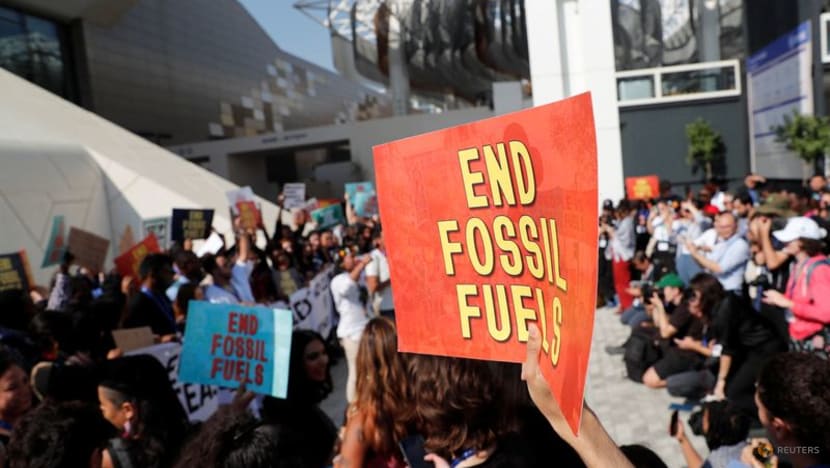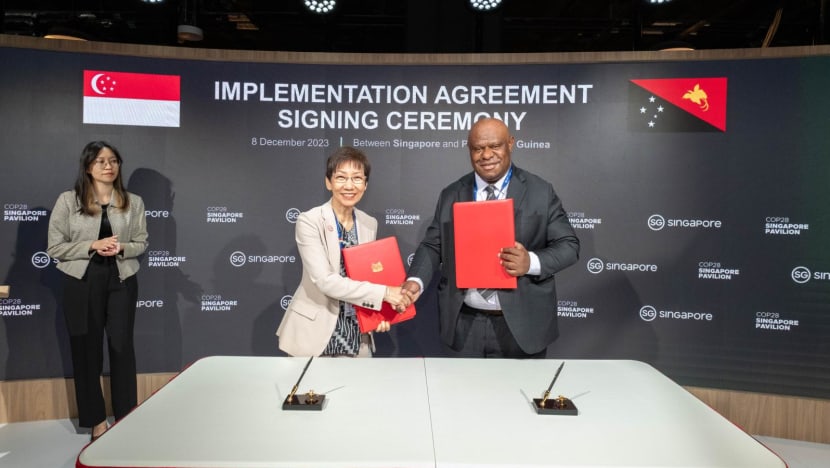COP28 deal may not please every party but a big leap for global collective action, says Singapore minister
Minister for Sustainability and the Environment Grace Fu, however, found the lack of progress on the rules of engagement around voluntary carbon markets disappointing.

Climate activists protest against fossil fuels at Dubai's Expo City during the United Nations Climate Change Conference COP28 in Dubai, United Arab Emirates, December 8, 2023. REUTERS/Thomas Mukoya/ File photo

This audio is generated by an AI tool.
SINGAPORE: An agreement to transition away from fossil fuels may not satisfy every party, but it “represents a significant stride towards global collective action”, said Minister for Sustainability and the Environment Grace Fu on Wednesday (Dec 13).
Representatives from nearly 200 countries struck the first-of-its-kind deal at the COP28 climate summit to begin reducing global consumption of fossil fuels, in a bid to avert the worst impacts of climate change.
References to fossil fuel subsidies and coal are unprecedented, said Ms Fu.
“This was an element that many parties did not want mentioned, given that at this moment, we are all facing cost-of-living issue, inflationary pressures,” she told reporters at the end of the 12-day summit.
“Are we totally happy with all the elements in there? The answer's no. But is it the package that is significant and meaningful to us? I think it is,” she added.
The deal was struck in Dubai after two weeks of hard-fought negotiations.
STRONG SIGNAL TO PRIVATE SECTOR
Ms Fu noted that the nations agreed to triple global renewable energy and double global energy efficiency by 2030.
“This is important for us because this will send a strong signal to the private sector to the industry and it will help shift investments to clean energy,” she said.
The deal has also provided guidance on technology such as low carbon fuels, electric vehicles, and carbon capture and storage, she added.
However, “ambition could have been higher”, she said, pointing out that there could have been greater clarification on coal-fired plants.
While Singapore already pegged the price for the long-term to fight against rising sea levels to S$100 billion, the amount may not be sufficient if the world is not acting fast enough, said Ms Fu.
She acknowledged that every country has its own limitations, including the need to balance economic development with environmental protection and climate action.
VOLUNTARY CARBON MARKETS
What was lacking, Ms Fu said, was movement on the rules of engagement around voluntary carbon markets under Article Six of the Paris climate agreement.
“On Article Six, we are disappointed that there was no progress,” she said.
“We will have rules, we will have to rely on rules and guidelines from COP26 and 27 but to facilitate the high integrity and robust carbon markets, we will want to work with like-minded countries and partners to develop the framework needed building on our existing efforts.”

In line with that, Singapore inked several deals to generate and buy carbon credits from countries including Papua New Guinea, Senegal and Rwanda.
Ms Cherine Fok, partner and head of KPMG’s sustainability programme Our Impact Plan, echoed Ms Fu’s view.
“The lack of progress on Article Six, clearly, is rather disappointing. But it doesn't stop Singapore from doing what we need to do and within what we can control,” she said.
“Our voluntary signatories and agreements with different countries on carbon trading, it falls back to us to be able to honour these promises, and to be able to demonstrate how we actually fulfil these responsibilities.”
She added that building trust in the ecosystem is important, as a great deal of why the climate agenda could not progress is due to the absence of trust in some countries.
“For Singapore, having progressed so far in the carbon trading and carbon agreements, it is a strong signal to us that we must continue to move ahead and not let perfection become a limit to progress,” she said.



















